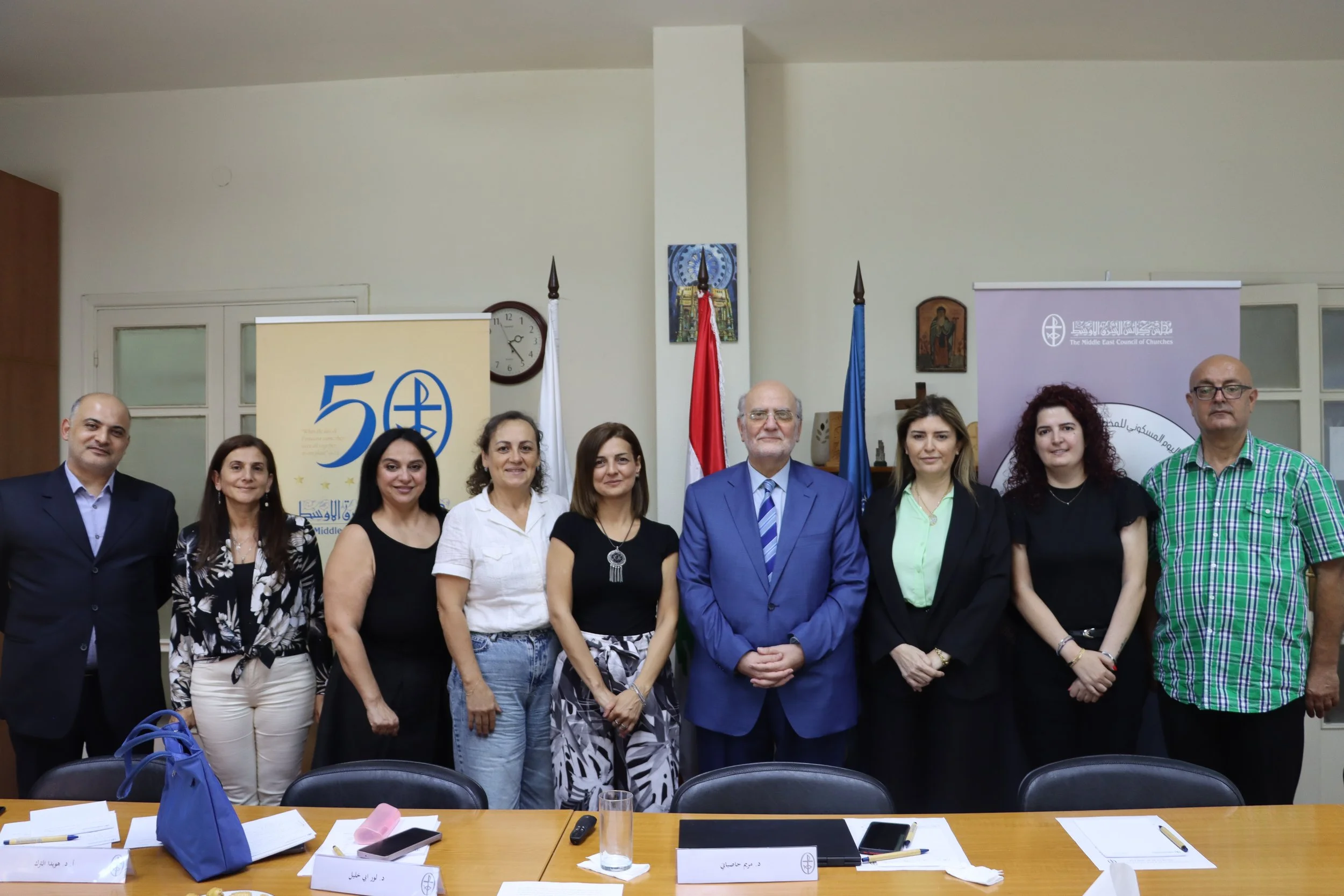Youth Emigration, A Challenge to Human Dignity
A Round Table Organized by the Middle East Council of Churches
Secretary General Dr. Michel Abs: people find themselves in a position where they disbelieve in their homeland and decide to leave this place, where there is economic oppression and social marginality
The Middle East Council of Churches (MECC) held a roundtable entitled “Youth Emigration, A Challenge to Human Dignity,” on Thursday 1 August 2024, at the MECC General Secretariat Offices in Beirut. This symposium is part of the series of monthly seminars launched by MECC, within the framework of the “Human Dignity Project” - “Dialogue and Social Cohesion-Social Capital Rehabilitation”, that MECC is working to implement consecutively.
The round table included two sessions in which researchers and specialists from various fields and Middle Eastern countries spoke. The first session revolved around the title “Youth Emigration: Concepts, Causes and Consequences,” and was moderated by Dr. Chawki Attieh. The second session was entitled “Forms of Migration,” moderated by Dr. Laure Abi Khalil.
The symposium began with an opening speech by Dr. Laure Abi Khalil. Attendees were specialists and interested people in the topic who participated at in the offices of the MECC General Secretariat or online via the “Zoom” platform. Noting that the symposium was broadcasted live on the MECC YouTube channel (first session - second session).
Firstly, the Secretary General of the Middle East Council of Churches (MECC) Dr. Michel Abs delivered a speech entitled “Youth Emigration, Embarrassment Until Departure!” in which he said, “Amidst circumstances of this kind, where it is very difficult to find - or establish - decent work, and where the available jobs, in terms of their content and income, put those who accept it in a state of Malthusian unemployment, people find themselves in a position where they disbelieve in their homeland and decide to leave this place, where there is economic oppression and social marginality. Noting that the disillusioned youth may abandon their values and morals and may join the work that will lead them to criminal prosecution.”
He added, "The other possible option is for the unemployed people to accept work in a field other than their specialty, which weakens their productive ability and puts them in a state of disguised unemployment. Suffering from disguised unemployment is bitter, because the work their will get is lower in rank and income than the work for which they are allocated. As well as, self-esteem hits rock bottom…”
Afterwards, the first session began, where Dr. Iman Abdel Wahab Mousa, Assistant Professor in the Department of Sociology, College of Arts, University of Mosul (Iraq), spoke about “Illegal Emigration to Iraq and Its Impact On Youth Emigration.” In addition, Dr. Mohammad Akram Al Kach, a Social Researcher (Syria), discussed about “The Repercussions of Youth Emigration on the Process of Opening the Demographic Window in Syria.”
Moreover, Dr. Suzan Menhem, a Lecturer and Researcher at the Lebanese University - Institute of Social Sciences (Lebanon), highlighted “The impact of Lebanese Youth Emigration on the Local Community and at the National Level.” Dr. Samia Kadri Wanis, Professor of Sociology at Ain Shams University (Egypt), presented an explanation about “Egyptian Youth Emigration, Opportunities and Challenges.” There was also an intervention from the International Organization for Migration (IOM) - Lebanon Office, delivered by Ms. Racha Chalita, National Program Officer.
Following the break, the second session began, where Prof. Dr. Howaida Al Turk, Acting Governor of Nabatieh, University Professor and Researcher, Coordinator of the Sociology of Work Laboratory at the Research Center of the Institute of Social Sciences (Lebanon), explained the topic of “The Emigration of Lebanese Youth Arising from Crises and their Socio-Economic Impacts.” Prof. Dr. Abdallah Al Mjaydel, Professor of Educational Sociology at the University of Damascus, and Social Studies Advisor at the Arab Center for Studies of Arid Zones and Dry Lands “ACSAD” - League of Arab States (Syria), presented an overview about “The Role of the Syrian Crisis in the Emergence of the Phenomenon of Syrian Youth Emigration – Al Hasakah as a Model.”
In addition, Prof. Mariam Chouman, a Digital Media Researcher (Palestine) talked about the topic “Emigration of Palestinian Youth. Forced or Voluntary?”. From her side, Dr. Mariam Hasbani, Doctor of Sociology, Researcher and Faculty Member at the Faculty of Arts and Sciences at the University of Balamand (Lebanon), sheds light on “The Emigration of Lebanese Students in the Context of Escalating Crises: A Forced Emigration Characterized by Neoliberal Ideology.”
The round table ended with a discussion and conclusion.





